The Great China's Geopolitical Road
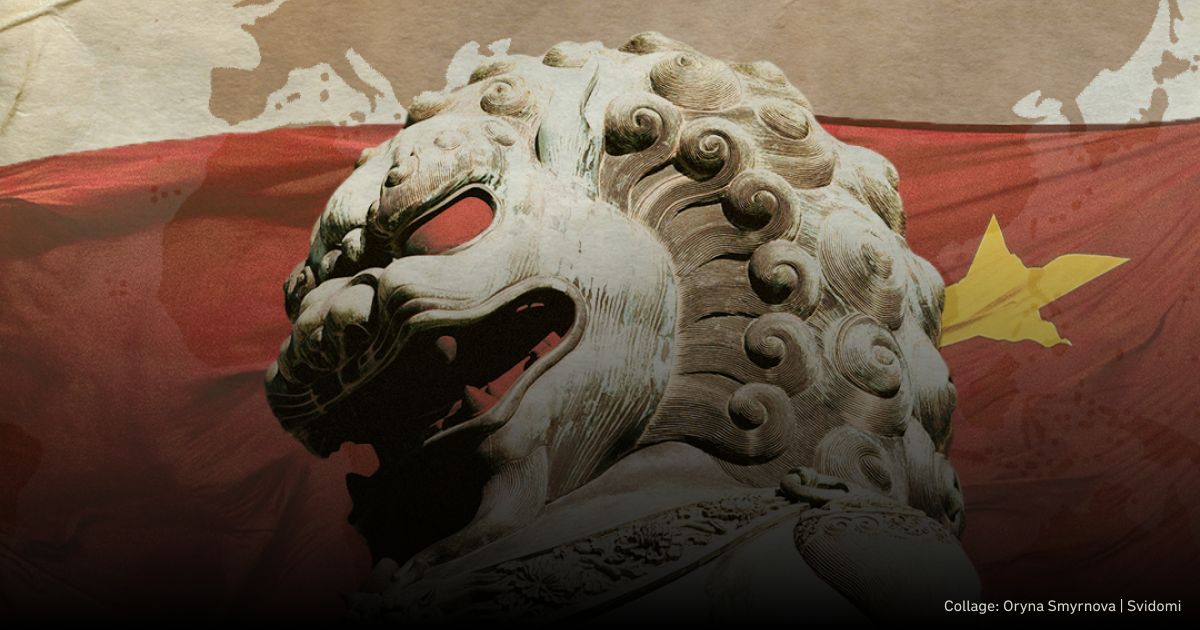
The Silk Road was once a trade route between the East and West, stretching from China through Central Asia, Egypt, African territories, and to the shores of the Mediterranean, such as Venice. China used this route to trade with many empires and expand its influence in Europe, Central Asia, and Africa.
BRICS is an international organization founded in 2009 by Brazil, Russia, India, China, and South Africa. It is an investment and economic organization for developing countries.
BRICS quickly emerged as a geopolitical rival to the G7 — the club of governments from seven highly developed countries (the United States, Japan, Germany, the United Kingdom, France, Italy, and Canada). The organization is expanding its membership to include countries from the Global South, such as Egypt and Iran. China increasingly controls the organization itself, using it to extend its influence over countries that feel marginalized by the Euro-Atlantic alliances of the US and the EU.
Svidomi tells how China is using the BRICS organization to promote its geopolitical vision of the world, including Russia's war against Ukraine.
How BRICS is conquering the Global South
The first African country to join BRICS was South Africa in 2010. Other members welcomed its membership, and the country's name was added to the organization's acronym.
Since then, BRICS has not officially expanded. The organization has remained an economic partnership between China, Russia, Brazil, India, and South Africa. Each country has contributed resources to the global economy: Brazil — agricultural land; Russia — minerals and oil and gas; China — cheap labor; India — affordable intellectual power; and South Africa — natural resources, both mineral and agricultural.
The members of BRICS quickly began to see the organization as a way to expand their influence in the global economy and geopolitics. Russia, through BRICS, pushed for the abandonment of the U.S. dollar as the global settlement currency in the marketplace.
The BRICS countries wanted to establish their own BRICS cable. This fiber-optic undersea communications system would carry telecommunications between member countries and connect to others along its route through ports in Russia, China, Singapore, India, Mauritius, South Africa, and Brazil. Currently, this initiative is still under development. The BRICS countries have expressed concern that the U.S. would control their communications through Europe, so they seek their communications transmission system. However, the U.S. has expressed concern that China and Russia could use this fiber optic system for espionage against the U.S.
The BRICS established the New Development Bank as an alternative to the International Monetary Fund. Like the IMF, the bank aims to finance other countries, focusing on developing countries or countries of the Global South.
According to the World Bank, the Global South is a term used to describe countries in Asia, Africa, Latin America, and the Caribbean that have low or middle incomes. BRICS is particularly focused on these nations.
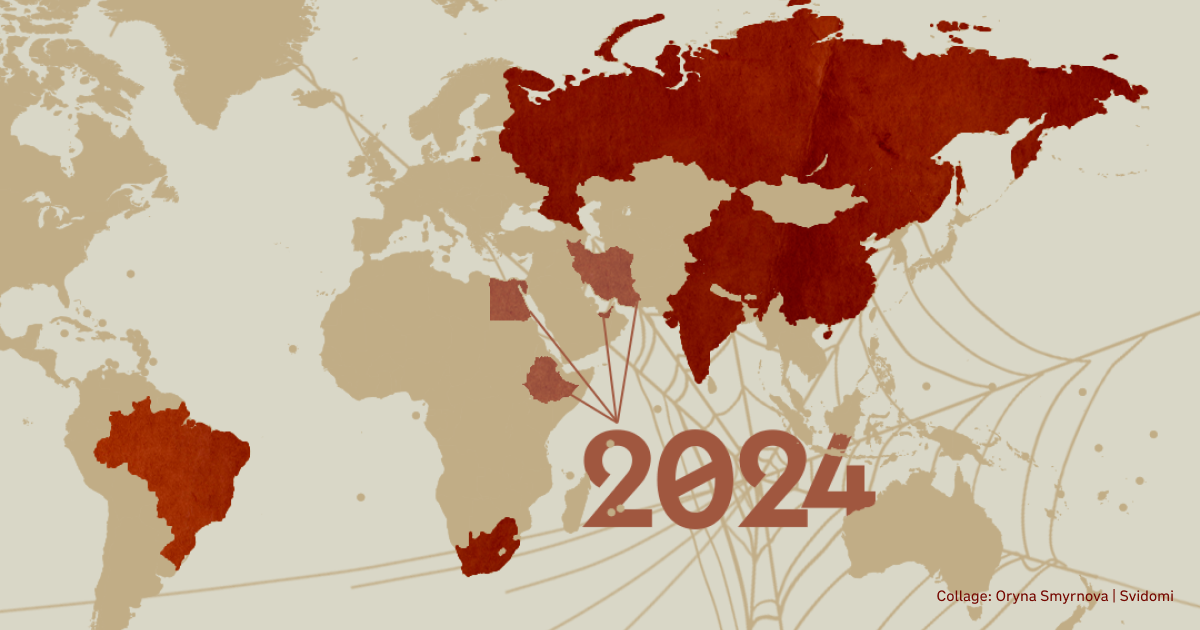
Russia's full-scale invasion of Ukraine accelerated the BRICS' geopolitical ambitions. The organization began actively inviting other countries to join. BRICS has no formal charter, so for a country to join, it requires only an initiative from that country and unanimous approval from the member states. In January 2024, Iran, Ethiopia, Egypt, and the United Arab Emirates joined BRICS. Argentina negotiated its accession in 2023, but in 2024, the new president, Javier Milei, withdrew the idea.
Türkiye has also announced its intention to join BRICS, while Azerbaijan, Malaysia, and Thailand have expressed interest. The organization itself has also shown a desire to include countries of the global south. In doing so, BRICS seeks to increase its geopolitical influence and position itself as a global counterweight to the United States and the Euro-Atlantic alliance.
Anton Hanotskyi, an expert with the ADASTRA Fellows think tank, says that undermining the global order and U.S. hegemony is at least one goal of China and Russia within BRICS.

“There are two views within the group about its future development. The first is to create an anti-Western bloc of countries that would implement parallel projects to the West, creating a global financial and political system outside the influence of the United States. Beijing and Moscow are actively lobbying for this approach by expanding the BRICS+ format to include rogue states, representatives of the Global South, and China's allies. In the quantitative expansion of BRICS, China sees an attempt to establish itself as the leader of the 'non-West,'”
he says of the core goals that some BRICS members are embedding in the organization.
In this case, India finds itself alone with the ambitions of China and Russia. It is one of the leading defence partners of the U.S. and does not want to sever its ties with the U.S. and Europe, and is even trying to strengthen them. Since 2018, India has held annual ministerial meetings with U.S. government officials "to strengthen ties between the two countries." For now, India is navigating between its partnerships with the U.S. and European countries and the increasingly anti-Western stance of BRICS.
"India and Brazil want to maintain the inclusiveness of BRICS and distance themselves from the anti-Western agenda. New Delhi and Brasília adhere to the idea of neutrality, seeing the group as an exclusive club for the largest non-Western economies and advocating for the purely economic nature of the organization. The Brazilian government opposed Iran's entry into BRICS, but under pressure from China, President Lula da Silva had to agree to the group's expansion," says Anton Hanotskyi.
He does not rule out the possibility of India leaving BRICS if the organization is fully transformed into an anti-Western bloc, mainly due to China's influence.
"The question of BRICS becoming an anti-Western bloc depends on the struggle between China and India for influence within the organization. At present, China exercises de facto control over BRICS activities, which indicates a move toward transforming BRICS into a group of countries interested in creating an alternative international order," he believes.
China's geopolitical path through BRICS
In March 2023, the Communist Party of China re-elected Xi Jinping as President of the People's Republic of China. To facilitate this, the constitution was amended in 2018 to allow one person to hold the presidency for more than two five-year terms. Now, Xi Jinping holds the presidency indefinitely.
In his third term, Xi Jinping outlined key policy directions: national security, defence, unification with Taiwan (a partially recognized island state, the Republic of China —ed.), boosting high-tech production economic development, and strengthening China's geopolitical role on the world stage. As such, BRICS quickly became one of China's tools for expanding its influence.
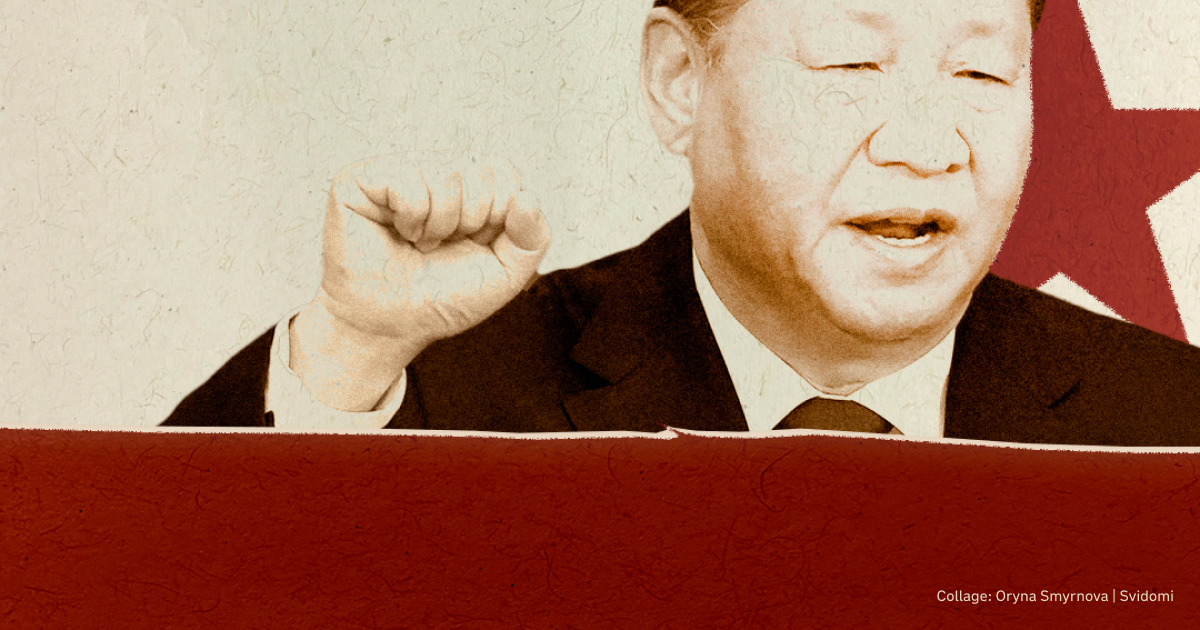
"One Belt, One Road" is China's trade initiative to connect the country with Central Asia, Europe, and Africa, similar to the historic Silk Road. China is trying to expand its economic influence in this way. Almost all the BRICS countries, except Brazil and India, are part of the initiative. China is also working to reduce its dependence on the port of Singapore, a U.S. ally in the Indo-Pacific region.
However, China is not allowing the BRICS members to distance themselves. China buys almost a third of Brazil's exports. China insisted on including Iran in BRICS — a country that has been under sanctions for more than 40 years.
Now, China is forming a "security structure" within the organization. After Iran's accession, China is using BRICS to spread its narrative of a "peaceful" ceasefire between Israel and Hamas, the bombings in Gaza, and now even Lebanon in the Middle East.
At the October 22-24 BRICS Summit in Kazan, Russia, the organization's members will welcome new members — Iran, Ethiopia, Egypt, and the United Arab Emirates — and announce that they are open to other countries joining. Russia has invited more than 20 countries to join BRICS, including Syria, Cuba, Venezuela, Congo, the Central African Republic, Colombia, Kazakhstan, Yemen, and even Belarus. Most of these countries belong to the Global South; some are partially recognized (like Palestine), and others are dictatorships (like Syria, Belarus, Colombia, etc.). BRICS is forming an "anti-Western coalition," with China being the most interested in this geopolitical project.
Anton Hanotskyi believes that China is using BRICS as another tool to expand its political and economic influence on countries in Africa, Asia, Latin America, and even Europe.

"Beijing spreads its narratives through all available platforms, and BRICS+ provides an opportunity to gather friendly countries into one group. Within the BRICS economic programs, Beijing promotes the yuanization of the global financial system and the creation of alternatives to the IMF, World Bank, and SWIFT. Given the recent trends in BRICS expansion, Xi Jinping is prioritizing this organization in his geopolitical ambitions to undermine the liberal world order,"
he says.
How China and Brazil promote an alternative "peace plan" to end the Russo-Ukrainian war
On May 23, 2024, China and Brazil presented their own "peace plan" to end Russia's war against Ukraine. China and Brazil called on Ukraine and Russia to "de-escalate the situation," "prevent the expansion of the battlefield," "create conditions for dialogue," and, most importantly, cease-fire. China also stressed the non-use of nuclear weapons in this "conflict." This plan is called the "Friends of Peace" plan.
China and Brazil presented their peace plan a few weeks before the summit in Switzerland on the peace formula that Ukraine is promoting to end the war. Ukraine's peace formula calls for a complete withdrawal of Russian troops from Ukrainian territory and the restoration of complete control over Ukraine's borders and territories temporarily occupied by Russia.
Ukrainian President Volodymyr Zelenskyy rejected the China-Brazil peace plan, calling it destructive.
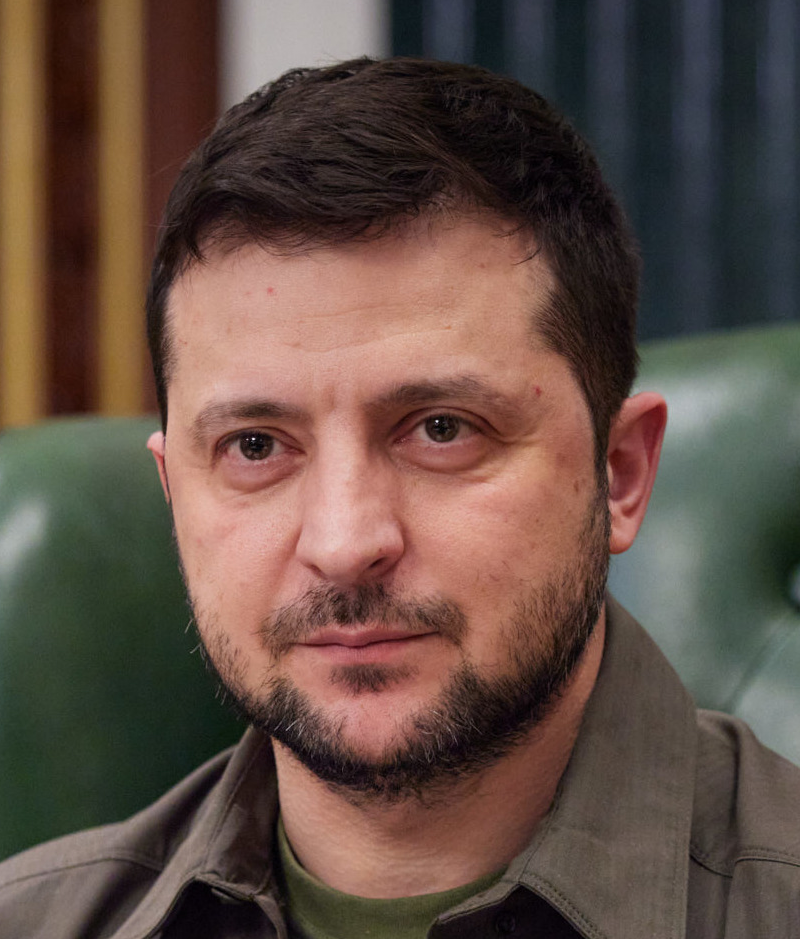
"Should we just give up our land, forget that they are killing our people? What is the compromise in that? That's why I think it's destructive. It's just a political statement,"
the president said.
China did not attend the Swiss peace summit. The Brazilian representative did not sign the final communiqué reaffirming support for Ukraine's peace formula, which includes nuclear safety, food security, and the return of prisoners and deportees.
China is actively promoting its peace plan to end the war in Ukraine, referring to Russia's war against Ukraine as the "Ukrainian crisis" and claiming that "more than 110 countries" support its plan. The Chinese government does not provide a complete list of these states. So far, Kazakhstan, Türkiye, Saudi Arabia, Mexico, and Kenya are known to support the plan.
Anton Hanotskyi believes that China's peace plan serves neither Ukraine's nor Russia's interests but rather other goals for China.
"Moscow is rhetorically expressing interest in the plan, but Putin has no intention of ending the war as long as Russian forces are advancing and there are resources to continue fighting. Beijing, too, understands the futility of its peace plan. The China-Brazil initiative aims to undermine international support for the Ukrainian peace formula. China can use this tool to make "concessions" to Western countries if they agree to stop supplying arms to Ukraine and weaken their sanctions against Russia. The plan itself is primarily a demonstration of China's political and economic leadership on the world stage," he notes.
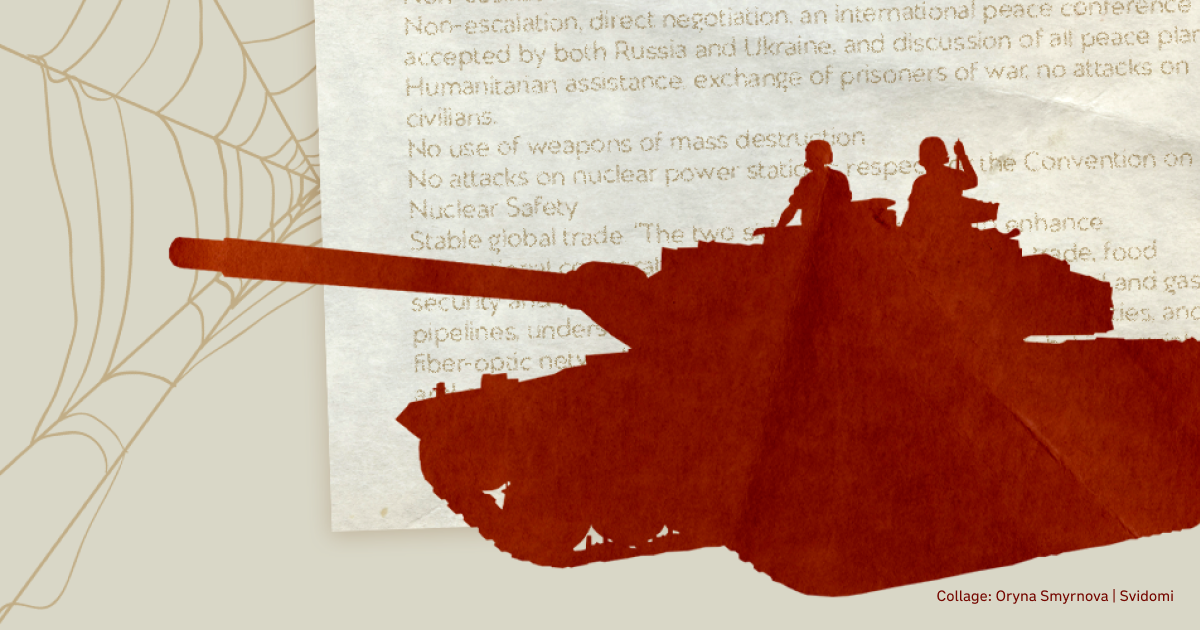
In May 2024, Volodymyr Zelenskyy stated that "China is working hard to prevent the country from attending the Global Peace Summit in Switzerland."
In September 2024, during the UN General Assembly, China and Brazil held a separate meeting of countries supporting the Chinese plan to end Russia's war against Ukraine. Switzerland and Hungary supported this initiative. Switzerland's ambassador to Ukraine, Felix Baumann, said that Switzerland was "participating as an observer in China—Brazil meeting" and called for a peaceful end to Russia's war against Ukraine.
Hungary immediately joined the Chinese initiative. Hungarian Foreign Minister Péter Szijjártó believes that "negotiations are the only way to end the war in Ukraine, and the sooner they begin, the more lives can be saved and the risk of escalation and further destruction can be reduced. Szijjártó also emphasized that the countries of the Global South "are tired of the war fueled by Europe. This underscored the target audience of the China-Brazil peace plan.
BRICS plays a crucial role in promoting China's peace plan for Ukraine. China intends to use this organization to influence countries in the Global South, thereby undermining support for Ukraine on the world stage. If BRICS continues to attract more countries, it will be more difficult for Ukraine to communicate its stance on ending the war and global politics.

"Moreover, the 'peacekeeping' activities of China and Brazil are aimed at whitewashing their cooperation with Russia in the eyes of the global community. The BRICS platform could well be used to advance the China-Brazil plan. The main goal is to dismantle two years of our diplomatic efforts to gain support for the peace formula among the countries of the global South,"
Anton Hanotskyi said.


